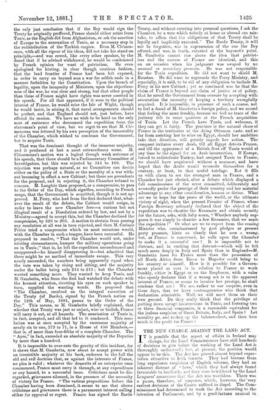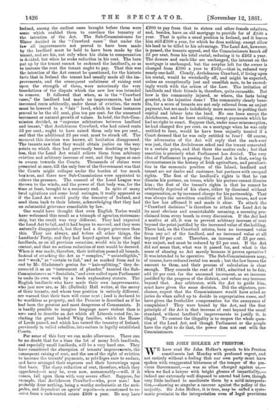THE NEW CHARGE AGAINST THE LAND ACT.
TT is possible that the aspect of affairs in Ireland may change, for the Land Commissioners have still hundreds of decisions to give before the working of the Land Act is thoroughly understood ; but, at present, the position would appear to be this. The Act has proved almost beyond expec- tation attractive to Irish tenants. They had become from long experience suspicious of English reforms, they had an inherent distrust of 'laws," which they had always found favourable to landlords, and they were bewildered by the Land Leaguers' assurances that the Act was worthless. There was a pause, therefore, of suspense, which, however, the 'very earliest decisions of the Courts sufficed to dispel. The Com- missioners had determined to work the Act according to the intention of Parliament, and by a good-fortune unusual in
Ireland, among the earliest cases brought before them were some which enabled them to convince the tenantry of the intention of the Act. The Sub-Commissioners for Ulster decided in the "Crawford cases" that under the law all improvements not proved to have been made by the landlord must be held to have been made by the tenant, and are his, not only when his claim to compensation is decided, but when he seeks reduction in his rent. The barn put up by the tenant cannot be reckoned the landlord's, so as to increase the rent the tenant ought to pay. That this was the intention of the Act cannot be questioned, for the historic facts that in Ireland the tenant had usually made all the im- provements, and the consequent unfairness of raising rent upon the strength of them, were notoriously the very foundations of the dispute which the new law was intended to remove. It followed that when, as in the "Crawford oases," the landlord had made no improvements, but had increased rents arbitrarily, under threat of eviction, the rents must be lowered to a " fair " level, which in these instances proved to be the old rent, plus ten per cent, for the unearned increment or natural growth of values. In brief, the Sub-Com- mission decided, as "supreme arbitrators between landlord and tenant," that Archdeacon Crawford, who had raised rents 33 per cent., ought to have raised them only ten per cent., and that the additional 23 per cent. must be struck off. The moment this decision was known, all hesitation disappeared. The tenants saw that they would obtain justice on the very points on which they had previously been doubting or hope- less, that the Land Act would relieve them from arbitrary eviction and arbitrary increase of rent, and they began at once to swarm towards the Courts. Thousands of claims were presented at once, till the only fear of the Government was that the Courts might collapse under the burden of too much -business, and three new Sub-Commissions were appointed to relieve the pressure. The counsel of the Land League was thrown to the winds, and the power of that body was, for the time at least, brought to a summary end. In spite of many local agitations and some local outrages, it really appeared as if the Land Act would pacify the tenantry of Ireland, and send them back to their labour, acknowledging that they had no substantial grievance remediable by law.
One would have thought that even English Tories would have welcomed this result as a triumph of agrarian, statesman- ship. but the result was very different. They had expected the Land Act to fail, and it had begun to succeed, and they were naturally disappointed, but they had a deeper grievance than this. They are always, and before all other things, the • Landlords' Party, and they had hoped against hope that the landlords, as on all previous occasions, would win in the legal contest, and that no serious reduction of rent would be decreed. When it was made, therefore, their irritation passed all bounds. Instead of attacking the Act as "complex," "unintelligible," and "weak," as "certain to fail," and as marked from end to end by Mr. Gladstone's genius for "hair-splitting," they de- nounced it as an "instrument of plunder," taunted the Sub- Commissioners as "Socialists," and even called upon Parliament to undo its own work by a fresh explanatory statute. The English landlords who have made their own improvements, who just now are, as Mr. (Bullock) Hall writes, at the mercy of their tenants, and whose true position is entirely different., are warmed that their turn will come next; land is declared to be worthless as property, and the Premier is described as if he had been the greatest and most dangerous of Communists. It is hardly possible to imagine language more violent than is now used to describe an Act which all Liberals voted for, in- cluding the great landed Whig families, which the House of Lords passed, and which has turned the tenantry of Ireland, previously in veiled rebellion, into suitors in legally established Courts.
For some of this fury we can make allowances. There can be no doubt that for a time the lot of many Irish landlords, and especially small landlords, will be a very hard one. They have considered the absorption of tenants' improvements, the consequent raising of rent, and the use of the right of eviction to increase the tenants' payments, as privileges sure to endure, and have arranged their expenses and their borrowings upon that basis. The sharp reduction of rent, therefore, which they apprehend—it may be, even now, unreasonably—will, if it comes, fall upon them with very severe effect. Suppose, for example, that Archdeacon Crawford—who, poor man! has probably done nothing, being a worthy ecclesiastic at the anti- podes, and dependent on agents' reparts—is accustomed to re- oewe from a rack-rented estate £600 a year. He may have
£200 to pay from that to sisters and other female relatives, and, besides, have an old mortgage to provide for of £100 a year. That is quite a usual position in Ireland, and it leaves him still£300 a year, for which he does nothing, except allow his land to be tilled to his advantage. The Land Act, however, is passed, the tenants appeal, and the Commissioners knock off 23 per cent, from his total rental, reducing it to £462 a year. The dowers and such-like are unchanged, the interest on the mortgage is unchanged, but the surplus left for the owner is changed from £300 a year to £162,—that is, reduced very nearly one-half. Clearly, Archdeacon Crawford, if living upon his rental, would be wretchedly off, and might be expected, unless an exceptionally just and unselfish man, to be exceed- ingly wroth with the action of the Law. The irritation of landlords and their friends is, therefore, quite excusable. But how is the community injured, or where, the facts being
granted, is the injustice done The community clearly bene- fits, for a score of tenants are not only relieved from an unjust payment, but are made indefinitely more secure in putting their capital and labour into the land. No one loses except the Archdeacon, and he loses nothing, except payments which he had no right to exact. Suppose that, under some misconception, he had charged five per cent. on a mortgage when he was only entitled to four, would he have been unjustly treated if a Court decreed that he was only entitled to four? Of course, the adversaries of the Act will reply that the rack-rent was just, that the Archdeacon asked and the tenant consented to a certain price, and that there the matter ends ; but that assertion is precisely what Parliament has denied. The very idea of Parliament in passing the Land Act is that, owing to circumstances in the history of Irish agriculture, and peculiari- ties in the economic position of the Island, landlord and tenant are not dealer and customer, but partners with unequal rights. The first of the landlord's rights is that he can dismiss his partner, on terms, while his partner cannot dismiss him ; the first of the tenant's rights is that he cannot be arbitrarily deprived of his share, either by dismissal without compensation, or by increased charge for his partnership. That was always the unwritten condition of Irish tenure, and now the law has affirmed it and made it clear. To attack the "Crawford decisions" is therefore to attack the Land Act in its most obvious and unmistakable meaning, a meaning pro- claimed from every bench in every discussion. If the Act had a motive at all, it was to prevent arbitrary increase of rent beyond the point justified by the increased value of the holding. There had, on the Crawford estates, been no increased value from any act of the landlord, and no increased value at all beyond 10 per cent. 'Therefore, an increase of 33 per cent. was unjust, and must be reduced by 23 per cent. If the Act did not mean that, what was it passed for, and what is the sense of abusing an Act merely because it proves operative ? It was intended to be operative. The Sub-Commissioners may, of course, have reduced rental too much; but the law leaves the amount to them, and their process of calculation is clear enough. They concede the rent of 1841, admitted to be fair, add 10 per cent, for the unearned increment, as an increase justified by the progress of the district, and refuse any increase beyond that. Any arbitrator, with the Act to guide him, must have given the same decision. Did the objectors, per- chance, expect that the Commissioners would have acted as juries do when called up to decide in expropriation cases, and have given the freeholder compensation for the annoyance of compulsion? They were bound by the Act, and the first principle of the Act is that increase of rent beyond the usual standard, without landlord's improvements to justify it, is illegal. To contest the illegality is to reopen the whole ques- tion of the Land Act, and though Parliament or the people have the right to do that, the power does not rest with the Commissioners.



































 Previous page
Previous page